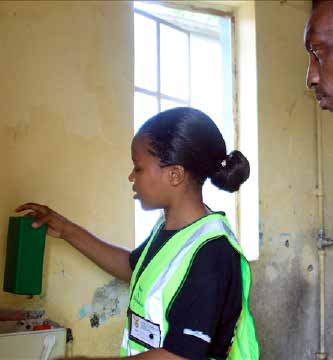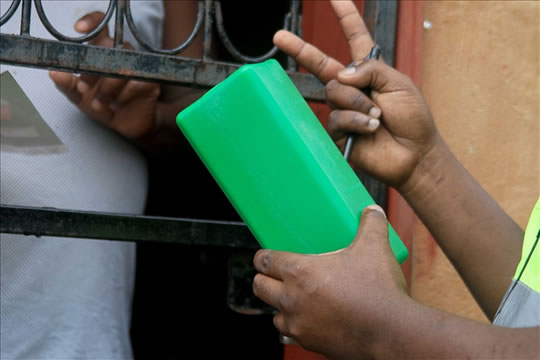The Department of Water and Sanitation has started rolling-out an eco-friendly innovation of placing a block in a toilet tank/cistern to save water.
 The Drop-The-Block is designed to reduce potable water consumption by one litre per flush. On average, toilet flushing uses up to 31 percent of the overall household consumption, making toilet flushing one of the highest consumers of water in the house.
The Drop-The-Block is designed to reduce potable water consumption by one litre per flush. On average, toilet flushing uses up to 31 percent of the overall household consumption, making toilet flushing one of the highest consumers of water in the house.
The Drop-The-Block team, comprising officials from the department and trainees from the “War on Leaks” programme, kick-started the exercise in Kimberley by visiting households in Ipopeng and Vergenoeg, where they dropped the block.
Once the block is installed, it requires no maintenance and allows the toilet to perform its primary function of waste disposal.
The department said that the water saving exercise would be rolled out to all the five District Municipalities in the Northern Cape.
“The objective is to distribute 300 000 blocks this year across the province, effectively saving 300 000 litres of water per household. In the Northern Cape, a number of priority municipalities have been identified and include among others Sol Plaatjie, Dikgatlong, Joe Morolong, Nama Khoi and Emthanjeni.
 “The municipalities are selected on the basis of households with cisterns bigger than nine litres, communities with extreme cases of drought, municipalities with high water losses, households with high per capita water consumption and indigent communities who cannot afford to pay for water services,” the department said.
“The municipalities are selected on the basis of households with cisterns bigger than nine litres, communities with extreme cases of drought, municipalities with high water losses, households with high per capita water consumption and indigent communities who cannot afford to pay for water services,” the department said.
The water use efficiency directorate in the Department of Water and Sanitation has also identified a number of municipalities throughout the country to benefit from the Drop-The-Block exercise.
In South Africa, the average water usage per household per day is way above the international average, at a staggering 253 litres per day compared with the international average of 173 litres per day.
The department urged residents to cooperate with the War on Leaks and Drop-The-Block officials.



 Facebook
Facebook Twitter
Twitter WhatsApp
WhatsApp